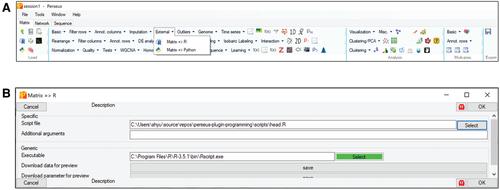Expanding the Perseus Software for Omics Data Analysis With Custom Plugins
Q1 Biochemistry, Genetics and Molecular Biology
Sung-Huan Yu, Daniela Ferretti, Julia P. Schessner, Jan Daniel Rudolph, Georg H. H. Borner, Jürgen Cox
下载PDF
{"title":"Expanding the Perseus Software for Omics Data Analysis With Custom Plugins","authors":"Sung-Huan Yu, Daniela Ferretti, Julia P. Schessner, Jan Daniel Rudolph, Georg H. H. Borner, Jürgen Cox","doi":"10.1002/cpbi.105","DOIUrl":null,"url":null,"abstract":"<p>The Perseus software provides a comprehensive framework for the statistical analysis of large-scale quantitative proteomics data, also in combination with other omics dimensions. Rapid developments in proteomics technology and the ever-growing diversity of biological studies increasingly require the flexibility to incorporate computational methods designed by the user. Here, we present the new functionality of Perseus to integrate self-made plugins written in C#, R, or Python. The user-written codes will be fully integrated into the Perseus data analysis workflow as custom activities. This also makes language-specific R and Python libraries from CRAN (cran.r-project.org), Bioconductor (bioconductor.org), PyPI (pypi.org), and Anaconda (anaconda.org) accessible in Perseus. The different available approaches are explained in detail in this article. To facilitate the distribution of user-developed plugins among users, we have created a plugin repository for community sharing and filled it with the examples provided in this article and a collection of already existing and more extensive plugins. © 2020 The Authors.</p><p><b>Basic Protocol 1</b>: Basic steps for R plugins</p><p><b>Support Protocol 1</b>: R plugins with additional arguments</p><p><b>Basic Protocol 2</b>: Basic steps for python plugins</p><p><b>Support Protocol 2</b>: Python plugins with additional arguments</p><p><b>Basic Protocol 3</b>: Basic steps and construction of C# plugins</p><p><b>Basic Protocol 4</b>: Basic steps of construction and connection for R plugins with C# interface</p><p><b>Support Protocol 4</b>: Advanced example of R Plugin with C# interface: UMAP</p><p><b>Basic Protocol 5</b>: Basic steps of construction and connection for python plugins with C# interface</p><p><b>Support Protocol 5</b>: Advanced example of python plugin with C# interface: UMAP</p><p><b>Support Protocol 6</b>: A basic workflow for the analysis of label-free quantification proteomics data using perseus</p>","PeriodicalId":10958,"journal":{"name":"Current protocols in bioinformatics","volume":"71 1","pages":""},"PeriodicalIF":0.0000,"publicationDate":"2020-09-15","publicationTypes":"Journal Article","fieldsOfStudy":null,"isOpenAccess":false,"openAccessPdf":"https://sci-hub-pdf.com/10.1002/cpbi.105","citationCount":"14","resultStr":null,"platform":"Semanticscholar","paperid":null,"PeriodicalName":"Current protocols in bioinformatics","FirstCategoryId":"1085","ListUrlMain":"https://onlinelibrary.wiley.com/doi/10.1002/cpbi.105","RegionNum":0,"RegionCategory":null,"ArticlePicture":[],"TitleCN":null,"AbstractTextCN":null,"PMCID":null,"EPubDate":"","PubModel":"","JCR":"Q1","JCRName":"Biochemistry, Genetics and Molecular Biology","Score":null,"Total":0}
引用次数: 14
引用
批量引用
Abstract
The Perseus software provides a comprehensive framework for the statistical analysis of large-scale quantitative proteomics data, also in combination with other omics dimensions. Rapid developments in proteomics technology and the ever-growing diversity of biological studies increasingly require the flexibility to incorporate computational methods designed by the user. Here, we present the new functionality of Perseus to integrate self-made plugins written in C#, R, or Python. The user-written codes will be fully integrated into the Perseus data analysis workflow as custom activities. This also makes language-specific R and Python libraries from CRAN (cran.r-project.org), Bioconductor (bioconductor.org), PyPI (pypi.org), and Anaconda (anaconda.org) accessible in Perseus. The different available approaches are explained in detail in this article. To facilitate the distribution of user-developed plugins among users, we have created a plugin repository for community sharing and filled it with the examples provided in this article and a collection of already existing and more extensive plugins. © 2020 The Authors.
Basic Protocol 1 : Basic steps for R plugins
Support Protocol 1 : R plugins with additional arguments
Basic Protocol 2 : Basic steps for python plugins
Support Protocol 2 : Python plugins with additional arguments
Basic Protocol 3 : Basic steps and construction of C# plugins
Basic Protocol 4 : Basic steps of construction and connection for R plugins with C# interface
Support Protocol 4 : Advanced example of R Plugin with C# interface: UMAP
Basic Protocol 5 : Basic steps of construction and connection for python plugins with C# interface
Support Protocol 5 : Advanced example of python plugin with C# interface: UMAP
Support Protocol 6 : A basic workflow for the analysis of label-free quantification proteomics data using perseus
扩展珀尔修斯软件组学数据分析与自定义插件
Perseus软件为大规模定量蛋白质组学数据的统计分析提供了一个全面的框架,也与其他组学维度相结合。蛋白质组学技术的快速发展和生物研究的日益多样化越来越需要灵活地结合用户设计的计算方法。在这里,我们展示了Perseus的新功能,可以集成用c#、R或Python编写的自制插件。用户编写的代码将作为自定义活动完全集成到Perseus数据分析工作流中。这也使得来自CRAN (cran.r-project.org)、Bioconductor (biocondutor.org)、PyPI (pypi.org)和Anaconda (anaconda.org)的特定语言的R和Python库在Perseus中可以访问。本文将详细解释不同的可用方法。为了便于在用户之间分发用户开发的插件,我们创建了一个用于社区共享的插件存储库,并在其中填充了本文中提供的示例以及已经存在的更广泛的插件集合。©2020作者。基本协议1:R插件的基本步骤支持协议1:带附加参数的R插件基本协议2:python插件的基本步骤支持协议2:带附加参数的python插件基本协议3:c#插件的基本步骤和构造基本协议4:带c#接口的R插件的构造和连接的基本步骤支持协议4:带c#接口的R插件的高级示例:umap基本协议5:支持协议5:使用c#接口的python插件的高级示例:UMAPSupport协议6:使用perseus分析无标签定量蛋白质组学数据的基本工作流程
本文章由计算机程序翻译,如有差异,请以英文原文为准。


 求助内容:
求助内容: 应助结果提醒方式:
应助结果提醒方式:


